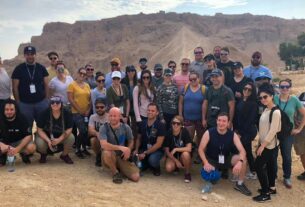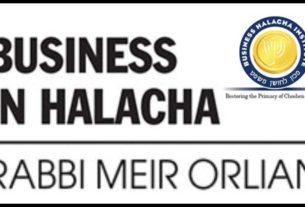Two Palestinians who flew to the United States on valid tourist visas to raise awareness about their village’s plight were denied entry and detained by federal border agents at San Francisco International Airport on Wednesday, according to a leader at the synagogue that sponsored their visit.
Members of Kehilla Community Synagogue in Piedmont, along with dozens of other supporters, protested at the airport starting Thursday morning. They demanded that the visitors, who are cousins identified by supporters as Eid Hathaleen and Awdah Hathaleen, be allowed to enter the country as planned.
The cousins, whom supporters describe as peaceful community leaders, are from the West Bank village of Umm Al-Khair, part of Masafer Yatta — a region whose residents say they are being forcibly displaced by Israeli authorities. The area was featured in the Oscar-winning Israeli-Palestinian documentary “No Other Land.”
Like the people portrayed in the film, the detained cousins maintain close ties with Israeli and American Jewish left-wing activists.
“This is a ridiculous and just insane decision to deny entry to folks who are coming to visit friends,” said Kehilla member Phillip Weintraub, who helped organize the trip and works as an immigration lawyer.
He said the men were traveling on Palestinian Authority passports and had obtained valid U.S. visas.
“One had a multi-entry visa issued in September, and the other just had their visa issued the first week of May,” Weintraub said. “They’re here on a humanitarian mission. What’s the problem?”
Weintraub was waiting at the airport Wednesday, expecting to greet the cousins shortly after their Qatar Airways flight landed around 1 p.m. But they never emerged. He later attempted to inquire about their status.
Late Wednesday night, a Customs and Border Protection official called Weintraub to confirm that the visas had been canceled and the men were being detained. The official did not provide a reason for the decision, Weintraub said.
CBP officers have broad authority to revoke visas and deport foreign visitors without a court hearing and denials have reportedly increased since the start of the Trump administration, which has made immigration and border security its signature issue.
CBP acknowledged an inquiry from the Jewish Telegraphic Agency but did not immediately provide further comment.
Catherine Seitz, legal director of the nonprofit legal services firm, Immigration Institute of the Bay Area, told the San Francisco Chronicle that it’s difficult to tell what happened with the little information that’s available.
“I can’t say whether this was a political decision by CBP or if they just thought that the people were likely to try and overstay their visas and possibly apply for asylum,” Seitz was quoted as saying.
Members of the American Jewish activist group Center for Jewish Nonviolence know the two Palestinians well, according to the group’s spokesperson, Chase Carter. Carter said lawyers have stepped forward to represent them and confirmed the cousins are still being held at the airport. They are scheduled to be deported on a Qatar Airways flight Thursday afternoon, Carter said.
Eid Hathaleen is an artist and photographer. Awdah Hathaleen is an English teacher who writes for the left-wing Israeli website +972 Magazine. Their itinerary included stops at Kehilla Community Synagogue and two United Methodist churches in the Bay Area. They also planned to visit Boston and Washington, D.C., for additional speaking engagements.
Kehilla is a progressive congregation based in Piedmont, a small, affluent town bordering Oakland. Part of the Jewish Renewal movement, the synagogue includes both Zionist and anti-Zionist members, according to Weintraub.
Kehilla has a long history of activism on global humanitarian issues. In 1985, it became the first Jewish house of worship to host a Central American refugee; in 1988, it adopted a Salvadoran community.
In the 1980s, Kehilla supported Palestinian statehood and called on Israel to negotiate with the Palestine Liberation Organization, when the position was still fringe in the Jewish community.
In one of his final major acts before his death last year, Kehilla’s founder, Rabbi Burt Jacobson, urged the congregation during a Yom Kippur workshop to pursue “Jewish reparations” for Palestinians. He envisioned a partnership between the synagogue and a Palestinian village.
Soon after, congregants launched an initiative called “Face-to-Face: A Jewish-Palestinian Reparations Alliance” and adopted Umm Al-Khair. Over the past two years, they’ve maintained regular Zoom communication with village leaders, offering solidarity and raising funds for basic necessities in a community that lacks most modern infrastructure.
Elisheva Goldberg, senior director of media and policy at the New Israel Fund, an organization that makes grants to left-wing and coexistence groups in Israel, said the pending deportations are likely to galvanize progressive Americans.
“The left is going to be upset about this in a different way than with the immigration issue, where you have to contend with questions of legality, or the college activism crackdown, where you have to deal with false claims that all protests against the war are antisemitic,” Goldberg said.
For her, this case, despite involving non-citizens, feels unambiguous.
“These are people who are here to talk about peace, and if they don’t get help from outside, they are going to be kicked off their land,” she said.
Keep Jewish Stories in Focus.
(JEWISH REVIEW) has documented Jewish history in real-time for over a century. Keep our journalism strong by joining us in supporting independent, award-winning reporting.




